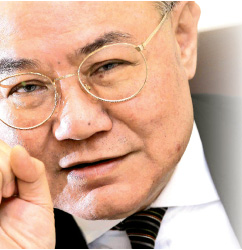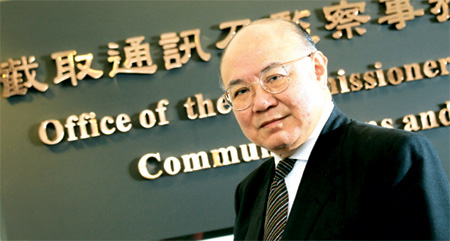A mission to protect
Updated: 2011-07-29 09:09
By Joseph Li(HK Edition)
|
|||||||
|
Woo Kwok-hing is glad that, with his efforts, law enforcement agencies have become more cooperative. Photos by Edmond Tang |
It's lonely being a judge, Woo Kwok-hing admits, but his present post as Commissioner on Interception of Communications and Surveillance is also a tough one. It is he who pioneered the work almost from scrap. Joseph Li writes.
Commissioner of Interception of Communications and Surveillance Woo Kwok-hing is pleased with the progress of his work, noting that the compliance of law enforcement agencies is improving.
Woo took up his post in August 2006, to tie in with the implementation of the Interception of Communications and Surveillance Ordinance and soon after retiring as the chairman of Electoral Affairs Commission.
In his view, the ordinance safeguards individual privacy and human rights, and at the same time helps law enforcement agencies combat serious crimes.
"The law aims to legalize and regulate interception of communications and surveillance, but not give investigators the convenience to do these things," Woo told China Daily in an exclusive interview.
"Interception of communications and surveillance are useful devices to detect serious crimes, though they involve huge resources. Without these, graft-busters cannot learn of the conversations between those who offer bribes and those who accept, and the same for police and customs officers who must track drug traffickers and buyers," Woo said.
The ordinance governs four law enforcement agencies, including the Hong Kong Police Force and the Independent Commission Against Corruption. Under the law, a wire tap must have prior authorization.
The law stipulates two types of surveillance. For type one surveillance, which is more intrusive as far as privacy and human rights are concerned, authorization from a panel of judges is required, he said. For the less intrusive type two surveillance, executive authorization by officers not below the rank of chief police superintendent or equivalent is needed.
The law explicitly protects privileged legal information, as between lawyer and client and journalistic information.
As commissioner, Woo reviews weekly reports from the agencies, and their applications to panel judges, whether or not the applications are approved. To avoid abuses, panel judges normally grant applications to intercept communications for a duration not exceeding two weeks although the law specifies a maximum period of three months, he noted.
The agencies are required to report special circumstances that warrant his attention. If he has doubts, he will require heads of the agencies to answer questions, provide documents and he may also check the case files at their offices.
The dedicated teams of officers accountable to him are very senior.
"For the police, it is a senior assistant commissioner, while for the ICAC, it is an assistant director. Those below the rank of superintendent can't even enter the meeting room," Woo said, jokingly.
Every time he visits an agency, he needs three days to read about 100 files. The main purpose is to check whether they have abused or exceeded their power, intercepted communications and tracked targets without authorization, or have accessed privileged legal information and journalistic information, he said.
The agencies did not cooperate with his office in the early years. And in response, he had no hesitation to incorporate cases of non-compliance in his annual report to the Chief Executive and vent his dissatisfaction at press conferences. He was however constrained from disclosing details of investigations and names of persons or agencies.
"They were not very willing to cooperate, yet dared not to not cooperate. Although I have the authority to ask questions, I felt they did not give me complete answers.

"I guess it was because they were not under regulation in the past. They were unhappy coming under regulation when the law came into being. They were also unhappy for having to do a lot of corrective work when I pointed out their irregularities," he observed.
In 2009, Woo, while addressing the press about his 2008 annual report, lambasted the attitude of one officer, who destroyed wire tap evidence and told Woo to obtain the materials from another source. Woo went so far as to call the officer cheeky and bordering on insubordinate.
At the beginning, there was not any systematic internal control or documentation of interception and surveillance operations.
"In 2007, I asked them to keep movements of the equipment, together with the dates borrowed and returned, and the authorization number.
"Since 2008, the inventory has been computerized. Investigators using the equipment and the authorizing officers both are required to log movements," he said.
Woo is glad that the situation and the attitude of the agencies have improved. "As time goes on, they have come to know it is my duty and I am helping them rather than standing in their way. They also know they will make no mistakes if they follow my instructions," he said.
As a deterrent, Woo has proposed to amend the law, giving him and his designated staff the power to hear the materials obtained by wire tap. "That empowers me to check if the officers have abused their power or accessed legally privileged information and journalistic information," he said. "It will be a very good deterrent. If they know I make random checks, they will work more carefully."
The government seems willing to empower him but not his staff. "If I am the only one to hear the materials, I have to sleep there," he said.
Compared with his previous jobs, Woo reckons a judge's job is a lonely one. "Judges don't meet a lot of people, but now I have close contacts with the law enforcement agencies," he said. "And whilst electoral affairs need to be fair, open and clean, I keep my present job secret to not jeopardize the investigations."
(HK Edition 07/29/2011 page4)
